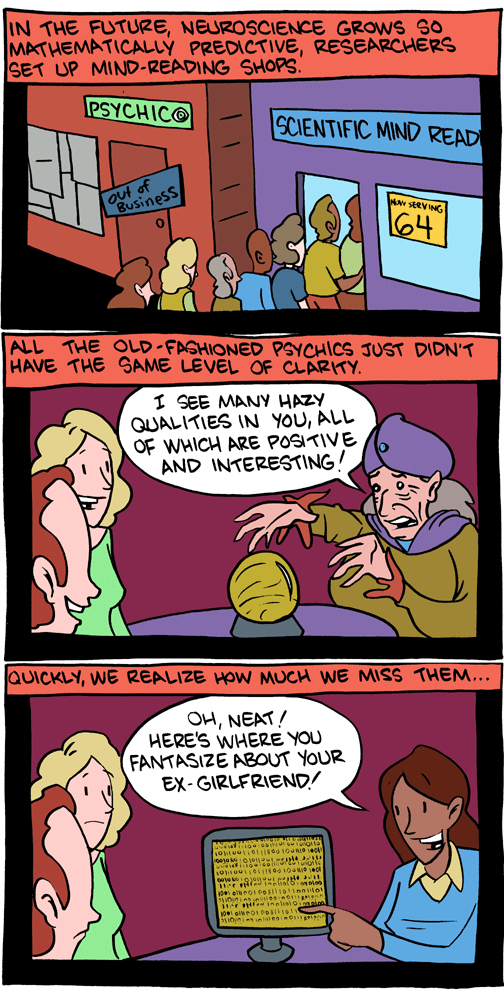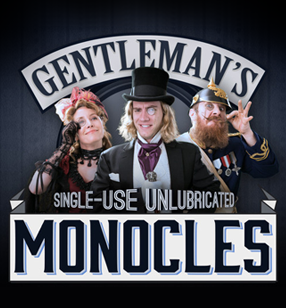Rotate phone to read blog
Posted January 15, 2010 at 12:00 am
About to put up my biggest blog post ever. But first, go here and donate if you can. If they reach 100k, I'll do a double update.
About Comedy
Every comedian I know has a story (or two, or three) about getting calls from Mom. Some have this call once a week, and some have this call once a month. Last night, I (deservedly) got the call.
I began to write an email to Mom in defense of myself, but it ballooned into some thoughts on the art of comedy in general, which I thought might be useful to some of my readers. So, for what it's worth, here are my notions about my profession, based on a few years' experience:
Being a Comedian
Years ago, I enrolled in a sketch comedy writing course at Second City: Los Angeles. This course was largely useful for having been made up exclusively of cautionary examples. There was middle-aged lady writing like it was 1975. There was depressed 20-something who couldn't write a punchline to save his life. There was this insane guy of uncertain age who kept making jokes about Robot Nixon. Lots of them.
One of the more garden variety members was angry has-been. What separated angry has-been from other teachers was that he was convinced, with religious fervor, that the sole purpose of comedy was social change. I remember one class in particular during which he asked us each what we thought the purpose of comedy was. To my everlasting astonishment, every other person (literally every damn one of them) knew the right answer - to change the world. My response? "Make people laugh."
It was as if some sort of secret pax had been established between all wannabe comedians, to which I was not privy. Being all of 22 years of age, I was looked at with avuncular disdain. At the time, I found their viewpoint irritating. Social change is great! But, the real point of comedy is, well, comedy.
Turns out we were both wrong. To this day, I believe my answer was essentially correct. Comedy per se is about making people laugh. However, comedy can and should be used to inform, to educate, and yes indeed to effect social change. The problem is that everyone in that room put the cart before the horse. Or, since we're talking comedians, let's say they put the buggy before the ass.
Comedy is useful for social change because it is a form of expression that allows the artist to say things that would otherwise be either unsayable or ignored. Comedy can be used to create a safe place for unpopular ideas. Comedy can be used to take a powderkeg of a situation and defuse it. But, it doesn't work unless you have the laughs.
So far, my approach of laughs first, social commentary second has served me well. My regular readers know I never do a comic purely because it is social commentary. If it does contain such a viewpoint, it will always be packaged with humor. In fact, I only do jokes with social commentary if I know they are as funny as my best non-topical gags.
The problem is that people get offended.
Being Offended
In order to accomplish the secondary goal of social change, you must first accomplish the primary goal of making people laugh. In order to do this, you have to be willing to walk the line of what is considered acceptable and not acceptable. One of the hazards of this is pissing off, well, everyone.
In retrospect, I often find that jokes I felt were acceptable when written, seem later to me myself to be in poor taste. Admittedly, this is at least in part based on social judgment, but it is also based on self judgment. Early on in cartooning, I did more jokes about topics like cancer and molestation. Now I wouldn't do those. Generally, they aren't funny unless you're so far removed from the topic, that you're not even really on it anymore. That is, when walking the line, in order to counterbalance a topic that is far over the line, you have to counterbalance so much it isn't worth it.
On the other hand, you can't nerf yourself entirely. If you do so, you're by definition walking on previously trodden ground. This is not a place for any artist to be, and it is certainly no place for a comedian.
The ideal joke, then, is one that is just off the acceptable line. For example, one joke I thought I did fairly well was on the topic of how people perceive the names of chemicals differently in different context. In specific, when people see multisyllabic chemicals on energy drinks, they are pleased, but when they see the same chemicals in their Velveeta, they are disgusted. Okay, so it's not the edgiest topic on Earth. But, think about it - people's views about their diets are things that are not brought up in casual conversation. I have personally had the experience of angering friends by telling them they don't understand what they're doing with food. So, you see, this is a topic that is just toward socially unacceptable, which makes it prime comedy material.
That said, people are often offended for the wrong reasons. First, people are usually only offended based on personal reasons, and not on global ethics systems. I recently discussed the minaret ban in Switzerland with a person I know. This is a person who is normally ruthlessly in favor of religious freedom, and entirely against racism. Yet, this ruthlessness seemed to diminish twhen talking about Muslims. In other words, racism (or religionism, or however you phrase it) was a very serious issues, so long as it had to do with the right race groups!
Second, people often fail to perceive the intent of a joke. This is one of the very fine lines in writing comedy. For example, I might write a stereotypical Jewish character, just to mock the idea of the stereotype. Today, most people would understand what I was up to and applaud it. But, it's a trickier game when dealing with gay issues. Sadly, gay stereotypes are still used frequently in media, so if I were to employ such a character (even in a farcical way), I'd run the risk of accidentally offending people. Unfortunately, people tend to judge other people's motivation very quickly, even though motivation is notoriously difficult to discern. And, most comedians are not allowed to spend a few hours writing an essay in self defense.
This brings me to my next section.
I am Not My Characters
This is a hard one. Even fellow comedians sometimes fail to grasp this, but it is very important. Just because I make light of an issue, it doesn't mean I agree, or that I think the issue is minor, or that I endorse any idea in particular. More than likely, the opposite is true.
However, when it comes to touchy subjects, many people are offended simply because a topic has come up at all. Some people are offended by violence. Some people are offendeded by blasphemy. Some people are offended by bad grammar! (yes, offended!)
More deeply, the overall attitude of a comedian's humor does not reflect the comedian's behavior. I have jokes about sex, drugs, cheating, violence, sexism, and probably a million other things that are, on the whole, not advisable in large quantities. But in my personal life, I am a quiet, studious, caring person. I don't drink. I don't do any drugs harder than coffee. I do not lie, cheat, or behave in a needlessly cruel manner. I have never been in a non-monogamous relationship. I love my friends, family, and fiancee dearly, and make an effort to help their lives when possible, and to tell them when I think they are going astray. I believe in the logic of mathematics, the social philosophy of Antoninus, and the general validity of the golden rule. I am, in sum, a very boring person.
And the weird thing? This is not atypical.
In fact, of all the fellow artists I've met (even, perhaps especially, those who do very offensive work) almost every single one has been a quiet, studious, hard-working person. People who write jokes so cruel I wouldn't touch them are often people who are the kindest souls I've met.
If this surprises you, ask yourself why. Do you, for example, expect someone who is an insurance adjuster to be more moral? On what basis? Everyone knows someone who's cheated on a loved one. Is that person always an artist?
You might say you were once in an artist or theater group, and you remember bad behavior. But, do you not also remember the median age in these groups? Do you think that behavior is less common in more respected groups of the same age, such as young doctors, lawyers, or scientists?
Of course, if you look for facts in a particular narrative, you will find them. If you want to determine that actors are slutty, you won't have trouble. If you want to decide comedians are all bastards, you'll find plenty of solid examples. But say you wanted to do the same with scientists - a group who are not known for immorality. Well, we could select Einstein or Feynman for philandering. Heisenberg for being a Nazi. Von Braun did not protest Slave labor. Watson is a racist and sexist. Schrodinger had two wives. Curie cheated with a married man. Schockley told his wife she had inferior genetics to his own. Using these samples, one could easily conclude that all scientists are unethical. I could do the same for mathematicians, monks, politicians, and (I suspect, if I had the ability to survey them) insurance adjusters.
You might say, "well, the bigger problem is fame and recognition." But, this is also not so. There are plenty of famous actors who are not known for unethical behavior, and who spend most of their time doing charity work. Think all economists are bad? Look at Warren Buffett. Think all billionaires are bad? Look at the Google guys, or Steve Wozniak, or Bill Gates.
My point is this: a person's professional calling cannot be simply tied to that person's personal behavior.
Indirect Results
Now, it might be said that just because you behave well personally, it doesn't excuse your public behavior. This is true, and returns us to the earlier discussion of social change vs. laughs.
In my experience, the combination of comedy and social message is useful for this reason: The comedy lets your listener/reader/watcher know that you're on her side, which opens her ears to your social message. Part of why I was comfortable doing a comic on gay marriage a few weeks ago was that I felt I had built up enough comedy cache with my readers. That is, they know I'm really here to make with the hahas, so if I mix in one with an embedded message, they (good God I hope...) don't feel like they're being preached to.
To give another example, take Penny Arcade. This well-loved comic is known both for its video game commentary, and for it's vicious (occasionally very offensive) freewheeling sense of humor. But, it is also known for its yearly charity drive, Child's Play. This, to me, is one of the greatest representations of the one-two punch of jokes and social change. Penny Arcade uses their sense of humor to let their readers know that "I AM LIKE YOU." Once that connection is established (and it is established solely by comedy, and not by strident social views), it can be used for good. Penny Arcade, which deals offensively with a form of entertainment that is sometimes offensive, raised nearly two million dollars for childrens' hospitals. This is a beautiful social development that simply would not exist without the personal connection created through comedy.
And yes, to create that connection, the comedy had to be somewhat edgy. It had to be able to cross boundaries. Have you ever seen two strangers getting chummy over perfectly polite and socially acceptable humor? No. Quick bonds of friendship are more often created with dirty jokes or gallows humor. I suspect this is because these things reveal something more intimate, which implies a level of trust.
Now, you might argue that just because an artist can effect social good, it doesn't automatically make his art acceptable. Stalin probably built orphanages, but he was still a dick. That's fair. It is an issue which every comedian has to grapple with. Am I indirectly affecting society in a bad way in order to directly affect society in a good way? For example, I might make a mindless violence joke, and use the social cache from its being funny to help fund relief efforts in a 3rd world country. But, it's possible that the initial joke will inadvertently affect someone's ethics negatively.
It's hard to tell. I recall once doing a comic in which a doctor calls "dibs" on a baby. To me, this was a dumb joke about a doctor misusing the logic of "I saw it first!" Later, a reader emailed me, laughing about how funny it was that I did a joke about a doctor having sex with a baby. To be clear - I would never, ever do a joke of this type. Ever. But, by accident, at least one person thought that I did.
I agonized over whether this result was my fault. And, if it was my fault (however indirectly), was it my responsibility? My eventual resolution was that I should do my best to make my jokes and viewpoint clear without compromising comedy. That was almost ten years ago now (holy balls!), and I think I've improved quite a bit in this regard since.
In other words, as a comedian, you have to accept that some of what you do will influence people in an undesirable way, but you also have to accept the responsibility for trying to marginalize that effect, and for trying to promote the opposite.
But, There Are Rules
To be absolutely clear: I'm not suggesting some sort of ethical anarchy for comedians. There are certain social standards to abide by, and more importantly, there are probably some topics that are generally speaking just simply off limits.
Among comedians, there is a sort of metajoke called "The Aristocrats." For the uninitiated, this is basically a joke wherein the joke-teller improvises the foulest, most horrible, most offensive sequence of events possible, and then ends with an utterly banal punchline, which goes: "What do you call it?" "The Aristocrats."
The reason it's funny to comedians is that it's the bare, raw material of comedy that comedians dare not show to audiences. In the same way a professional chef might appreciate the flavor of a raw onion, but would never serve it as such, a comedian works with every type of untouchable topic in order to serve up meaningful jokes. For example, most comedians would not do a joke that was simply about a death in wartime. It's sad, gruesome, and horrible. However, no comedian would shy away from a joke about the Iraq war. And yet the reason the latter will be funny is in large part due to the former. Jokes about the Iraq war are poignant because, at core, they are about something unspeakable. The horror of war is the raw onion. The Iraq joke is the onion soup.
In other words, as a comedian, you have to deal with topics that are far past the line in order to be able to do the necessary task of skirting the line. For any time someone says to you "That joke disgusted me," you will be able to think "you should've seen the one I didn't do!" Occasionally, we all slip and do "the one I didn't do." It's inevitable, and perhaps regrettable. But, it's part of the game.
In Conclusion
I want to close by saying to all the other comedians who get the Mom call that you should be pleased whenever it happens. I know several comedians who lament that their parents don't care enough to even read their comics, much less call. The irony is that the people most likely to get the call are also the people most likely to be upset by it. I am an unapologetically insensitive bastard, but when I get the Mom call, it still turns my stomach upside down. Upside down enough, in fact, that I feel the need to spent my evening writing a 3,000 word essay to falteringly (and not without fear of making the situation worse) prove that I am, indeed, a good kid.
Hopefully I've transmuted some of my personal discomfort into some useful meditations for other comedians.
I'm gonna buy a damn big card next Mother's Day.
-Zach
About Comedy
Every comedian I know has a story (or two, or three) about getting calls from Mom. Some have this call once a week, and some have this call once a month. Last night, I (deservedly) got the call.
I began to write an email to Mom in defense of myself, but it ballooned into some thoughts on the art of comedy in general, which I thought might be useful to some of my readers. So, for what it's worth, here are my notions about my profession, based on a few years' experience:
Being a Comedian
Years ago, I enrolled in a sketch comedy writing course at Second City: Los Angeles. This course was largely useful for having been made up exclusively of cautionary examples. There was middle-aged lady writing like it was 1975. There was depressed 20-something who couldn't write a punchline to save his life. There was this insane guy of uncertain age who kept making jokes about Robot Nixon. Lots of them.
One of the more garden variety members was angry has-been. What separated angry has-been from other teachers was that he was convinced, with religious fervor, that the sole purpose of comedy was social change. I remember one class in particular during which he asked us each what we thought the purpose of comedy was. To my everlasting astonishment, every other person (literally every damn one of them) knew the right answer - to change the world. My response? "Make people laugh."
It was as if some sort of secret pax had been established between all wannabe comedians, to which I was not privy. Being all of 22 years of age, I was looked at with avuncular disdain. At the time, I found their viewpoint irritating. Social change is great! But, the real point of comedy is, well, comedy.
Turns out we were both wrong. To this day, I believe my answer was essentially correct. Comedy per se is about making people laugh. However, comedy can and should be used to inform, to educate, and yes indeed to effect social change. The problem is that everyone in that room put the cart before the horse. Or, since we're talking comedians, let's say they put the buggy before the ass.
Comedy is useful for social change because it is a form of expression that allows the artist to say things that would otherwise be either unsayable or ignored. Comedy can be used to create a safe place for unpopular ideas. Comedy can be used to take a powderkeg of a situation and defuse it. But, it doesn't work unless you have the laughs.
So far, my approach of laughs first, social commentary second has served me well. My regular readers know I never do a comic purely because it is social commentary. If it does contain such a viewpoint, it will always be packaged with humor. In fact, I only do jokes with social commentary if I know they are as funny as my best non-topical gags.
The problem is that people get offended.
Being Offended
In order to accomplish the secondary goal of social change, you must first accomplish the primary goal of making people laugh. In order to do this, you have to be willing to walk the line of what is considered acceptable and not acceptable. One of the hazards of this is pissing off, well, everyone.
In retrospect, I often find that jokes I felt were acceptable when written, seem later to me myself to be in poor taste. Admittedly, this is at least in part based on social judgment, but it is also based on self judgment. Early on in cartooning, I did more jokes about topics like cancer and molestation. Now I wouldn't do those. Generally, they aren't funny unless you're so far removed from the topic, that you're not even really on it anymore. That is, when walking the line, in order to counterbalance a topic that is far over the line, you have to counterbalance so much it isn't worth it.
On the other hand, you can't nerf yourself entirely. If you do so, you're by definition walking on previously trodden ground. This is not a place for any artist to be, and it is certainly no place for a comedian.
The ideal joke, then, is one that is just off the acceptable line. For example, one joke I thought I did fairly well was on the topic of how people perceive the names of chemicals differently in different context. In specific, when people see multisyllabic chemicals on energy drinks, they are pleased, but when they see the same chemicals in their Velveeta, they are disgusted. Okay, so it's not the edgiest topic on Earth. But, think about it - people's views about their diets are things that are not brought up in casual conversation. I have personally had the experience of angering friends by telling them they don't understand what they're doing with food. So, you see, this is a topic that is just toward socially unacceptable, which makes it prime comedy material.
That said, people are often offended for the wrong reasons. First, people are usually only offended based on personal reasons, and not on global ethics systems. I recently discussed the minaret ban in Switzerland with a person I know. This is a person who is normally ruthlessly in favor of religious freedom, and entirely against racism. Yet, this ruthlessness seemed to diminish twhen talking about Muslims. In other words, racism (or religionism, or however you phrase it) was a very serious issues, so long as it had to do with the right race groups!
Second, people often fail to perceive the intent of a joke. This is one of the very fine lines in writing comedy. For example, I might write a stereotypical Jewish character, just to mock the idea of the stereotype. Today, most people would understand what I was up to and applaud it. But, it's a trickier game when dealing with gay issues. Sadly, gay stereotypes are still used frequently in media, so if I were to employ such a character (even in a farcical way), I'd run the risk of accidentally offending people. Unfortunately, people tend to judge other people's motivation very quickly, even though motivation is notoriously difficult to discern. And, most comedians are not allowed to spend a few hours writing an essay in self defense.
This brings me to my next section.
I am Not My Characters
This is a hard one. Even fellow comedians sometimes fail to grasp this, but it is very important. Just because I make light of an issue, it doesn't mean I agree, or that I think the issue is minor, or that I endorse any idea in particular. More than likely, the opposite is true.
However, when it comes to touchy subjects, many people are offended simply because a topic has come up at all. Some people are offended by violence. Some people are offendeded by blasphemy. Some people are offended by bad grammar! (yes, offended!)
More deeply, the overall attitude of a comedian's humor does not reflect the comedian's behavior. I have jokes about sex, drugs, cheating, violence, sexism, and probably a million other things that are, on the whole, not advisable in large quantities. But in my personal life, I am a quiet, studious, caring person. I don't drink. I don't do any drugs harder than coffee. I do not lie, cheat, or behave in a needlessly cruel manner. I have never been in a non-monogamous relationship. I love my friends, family, and fiancee dearly, and make an effort to help their lives when possible, and to tell them when I think they are going astray. I believe in the logic of mathematics, the social philosophy of Antoninus, and the general validity of the golden rule. I am, in sum, a very boring person.
And the weird thing? This is not atypical.
In fact, of all the fellow artists I've met (even, perhaps especially, those who do very offensive work) almost every single one has been a quiet, studious, hard-working person. People who write jokes so cruel I wouldn't touch them are often people who are the kindest souls I've met.
If this surprises you, ask yourself why. Do you, for example, expect someone who is an insurance adjuster to be more moral? On what basis? Everyone knows someone who's cheated on a loved one. Is that person always an artist?
You might say you were once in an artist or theater group, and you remember bad behavior. But, do you not also remember the median age in these groups? Do you think that behavior is less common in more respected groups of the same age, such as young doctors, lawyers, or scientists?
Of course, if you look for facts in a particular narrative, you will find them. If you want to determine that actors are slutty, you won't have trouble. If you want to decide comedians are all bastards, you'll find plenty of solid examples. But say you wanted to do the same with scientists - a group who are not known for immorality. Well, we could select Einstein or Feynman for philandering. Heisenberg for being a Nazi. Von Braun did not protest Slave labor. Watson is a racist and sexist. Schrodinger had two wives. Curie cheated with a married man. Schockley told his wife she had inferior genetics to his own. Using these samples, one could easily conclude that all scientists are unethical. I could do the same for mathematicians, monks, politicians, and (I suspect, if I had the ability to survey them) insurance adjusters.
You might say, "well, the bigger problem is fame and recognition." But, this is also not so. There are plenty of famous actors who are not known for unethical behavior, and who spend most of their time doing charity work. Think all economists are bad? Look at Warren Buffett. Think all billionaires are bad? Look at the Google guys, or Steve Wozniak, or Bill Gates.
My point is this: a person's professional calling cannot be simply tied to that person's personal behavior.
Indirect Results
Now, it might be said that just because you behave well personally, it doesn't excuse your public behavior. This is true, and returns us to the earlier discussion of social change vs. laughs.
In my experience, the combination of comedy and social message is useful for this reason: The comedy lets your listener/reader/watcher know that you're on her side, which opens her ears to your social message. Part of why I was comfortable doing a comic on gay marriage a few weeks ago was that I felt I had built up enough comedy cache with my readers. That is, they know I'm really here to make with the hahas, so if I mix in one with an embedded message, they (good God I hope...) don't feel like they're being preached to.
To give another example, take Penny Arcade. This well-loved comic is known both for its video game commentary, and for it's vicious (occasionally very offensive) freewheeling sense of humor. But, it is also known for its yearly charity drive, Child's Play. This, to me, is one of the greatest representations of the one-two punch of jokes and social change. Penny Arcade uses their sense of humor to let their readers know that "I AM LIKE YOU." Once that connection is established (and it is established solely by comedy, and not by strident social views), it can be used for good. Penny Arcade, which deals offensively with a form of entertainment that is sometimes offensive, raised nearly two million dollars for childrens' hospitals. This is a beautiful social development that simply would not exist without the personal connection created through comedy.
And yes, to create that connection, the comedy had to be somewhat edgy. It had to be able to cross boundaries. Have you ever seen two strangers getting chummy over perfectly polite and socially acceptable humor? No. Quick bonds of friendship are more often created with dirty jokes or gallows humor. I suspect this is because these things reveal something more intimate, which implies a level of trust.
Now, you might argue that just because an artist can effect social good, it doesn't automatically make his art acceptable. Stalin probably built orphanages, but he was still a dick. That's fair. It is an issue which every comedian has to grapple with. Am I indirectly affecting society in a bad way in order to directly affect society in a good way? For example, I might make a mindless violence joke, and use the social cache from its being funny to help fund relief efforts in a 3rd world country. But, it's possible that the initial joke will inadvertently affect someone's ethics negatively.
It's hard to tell. I recall once doing a comic in which a doctor calls "dibs" on a baby. To me, this was a dumb joke about a doctor misusing the logic of "I saw it first!" Later, a reader emailed me, laughing about how funny it was that I did a joke about a doctor having sex with a baby. To be clear - I would never, ever do a joke of this type. Ever. But, by accident, at least one person thought that I did.
I agonized over whether this result was my fault. And, if it was my fault (however indirectly), was it my responsibility? My eventual resolution was that I should do my best to make my jokes and viewpoint clear without compromising comedy. That was almost ten years ago now (holy balls!), and I think I've improved quite a bit in this regard since.
In other words, as a comedian, you have to accept that some of what you do will influence people in an undesirable way, but you also have to accept the responsibility for trying to marginalize that effect, and for trying to promote the opposite.
But, There Are Rules
To be absolutely clear: I'm not suggesting some sort of ethical anarchy for comedians. There are certain social standards to abide by, and more importantly, there are probably some topics that are generally speaking just simply off limits.
Among comedians, there is a sort of metajoke called "The Aristocrats." For the uninitiated, this is basically a joke wherein the joke-teller improvises the foulest, most horrible, most offensive sequence of events possible, and then ends with an utterly banal punchline, which goes: "What do you call it?" "The Aristocrats."
The reason it's funny to comedians is that it's the bare, raw material of comedy that comedians dare not show to audiences. In the same way a professional chef might appreciate the flavor of a raw onion, but would never serve it as such, a comedian works with every type of untouchable topic in order to serve up meaningful jokes. For example, most comedians would not do a joke that was simply about a death in wartime. It's sad, gruesome, and horrible. However, no comedian would shy away from a joke about the Iraq war. And yet the reason the latter will be funny is in large part due to the former. Jokes about the Iraq war are poignant because, at core, they are about something unspeakable. The horror of war is the raw onion. The Iraq joke is the onion soup.
In other words, as a comedian, you have to deal with topics that are far past the line in order to be able to do the necessary task of skirting the line. For any time someone says to you "That joke disgusted me," you will be able to think "you should've seen the one I didn't do!" Occasionally, we all slip and do "the one I didn't do." It's inevitable, and perhaps regrettable. But, it's part of the game.
In Conclusion
I want to close by saying to all the other comedians who get the Mom call that you should be pleased whenever it happens. I know several comedians who lament that their parents don't care enough to even read their comics, much less call. The irony is that the people most likely to get the call are also the people most likely to be upset by it. I am an unapologetically insensitive bastard, but when I get the Mom call, it still turns my stomach upside down. Upside down enough, in fact, that I feel the need to spent my evening writing a 3,000 word essay to falteringly (and not without fear of making the situation worse) prove that I am, indeed, a good kid.
Hopefully I've transmuted some of my personal discomfort into some useful meditations for other comedians.
I'm gonna buy a damn big card next Mother's Day.
-Zach






















